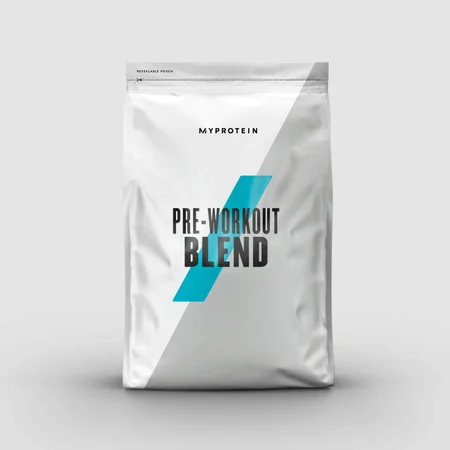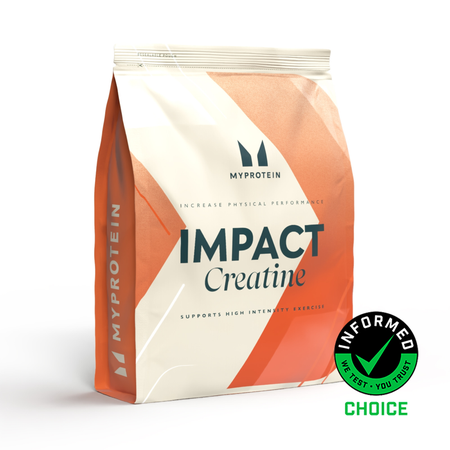
Getting to the gym is hard enough at the best of times — and pushing through till the end of your workout is another challenge. What if we told you that just a spoonful of pre-workout helps stop your energy levels going down? Okay, it doesn’t quite have the same ring to it, but pre-workout supplements could be the secret medicine to maximising your workouts.
A pre-workout supplement can give you an extra boost to complete your workouts, whilst also bringing benefits to performance and body composition.
Read on, as we discover how to get workout-ready!
In This Article, You'll Find:
What Is Pre-Workout?
Pre-workout is an ergogenic (performance-enhancing) supplement, which most commonly comes in powder form. It tends to contain a mixture of ingredients, including caffeine, amino acids, and vitamins — which, when combined, can maximise both aerobic (endurance) and anaerobic (strength/power) performance.1
Pre-workout exerts its effects by delaying the onset of fatigue. This means you can train for longer and harder before throwing in the towel.2 As a result of these more intense sessions, you can get stronger, faster, and improve muscle mass, if you continue taking pre-workout regularly.3
What Are The Benefits Of Pre-Workout?
To start off with, let’s highlight the practicality of pre-workout. Many pre-workouts contain caffeine, beta-alanine, creatine, citrulline, taurine, tyrosine, and B vitamins — that’s just the core ingredients. Imagine having to take 7+ different supplements, considering the correct dosage and timings of each. With pre-workout, the groundwork is done for you. So, what’s the point in taking pre-workout anyway? Well…
Pre-workout keeps you stronger for longer – Typically, when performing resistance exercise, you won’t be able to lift as heavy, or complete as many reps, on your last set as you did on your first. Pre-workout could help delay this muscular fatigue, by allowing you to perform more reps before your muscles give out. This effect is believed to be down to the caffeine in pre-workout.4
Pre-workout can boost power — Sudden bursts of activity, such as sprinting, require power — the amount of work completed in a given time. Pre-workout has shown to increase the amount of distance covered in 25 seconds of maximal effort sprinting. In other words, your new 100m sprint personal best could be achieved with the help of pre-workout.5
It could also improve endurance — Although not much research has looked at the effects of pre-workout on endurance performance, the results so far look promising. For example, in one study, participants who consumed pre-workout before a treadmill exercise trial were able to run for 12.5% longer than those who didn’t take the pre-workout.5 So, it would seem pre-workout could be beneficial for those who are in it for the long run too.
The effects can be mental — As well as physical effects, pre-workout enhances cognitive processes, such as alertness, focus, reaction time, perception of energy, and positive vibes.6 If you’re a regular exerciser, you’ll know that half of the success comes from mentality — if your head is in the right place, your body will follow.
Pre-workout could improve body composition — long-term consumption of pre-workout, in combination with a resistance training programme, has lead to greater increases in lean muscle mass compared to placebo.3 Or, if you’re new to training, pre-workout could help you lose more fat mass than the exercise alone.7
Summary of benefits
We’ve dug into the research and pre-workout appears to be beneficial all-around. Whether your goal is to climb the ranks in performance, tweak your physique, or give yourself a mental boost, pre-workout will get you kickstarted.
Caffeine As A Pre-Workout
Caffeine is a key ingredient of most pre-workout powders and is responsible for several ergogenic (performance-enhancing) effects. It can enhance endurance performance, increase alertness in skill and accuracy-based sports (like golf), and is useful for team-sports by improving passing accuracy, sprinting, and jumping.8
Crucially, caffeine causes vasodilation. This is the widening of your blood vessels, meaning more blood and oxygen can be delivered to your working muscles. Caffeine also plays a role in muscle contraction and cognition, which contributes to the mental effects of pre-workout.9
Other Pre-Workout Supplements
Beta-Alanine is an amino acid that’s a precursor for carnosine — an intracellular pH buffer. When you exercise, there is an accumulation of hydrogen ions in your muscles, which makes them more acidic (known as acidosis). This is associated with early fatigue. As a pH buffer, carnosine prevents muscle acidosis and allows your muscles to keep working for longer before they fatigue.10
This amino acid is a precursor to nitric oxide, which acts as a vasodilator (widens blood vessels). Therefore, L-Citrulline helps increase blood flow and oxygen delivery to working muscles, providing them with more energy for movement. More energy equals better exercise performance.11
Creatine is an amino acid, which, when supplemented, increases stores of phosphocreatine within muscles. This is the main energy source used for sudden bursts of high-intensity exercise (like a deadlift). As such, creatine can enhance high-intensity exercise performance, as well as exercise recovery. Another benefit of creatine is its association with lean body mass gains during resistance training.12
As a conditionally essential amino acid, glutamine can be produced in the body, but under some physiological circumstances (such as physical stress, injury, or excessive exercise), you have a greater need for glutamine, and so a supplement may be useful. Glutamine plays a role in reducing muscle damage and inflammation caused by exercise — as such, it aids in exercise recovery, so you’re ready for your next session.13
Branched-chain amino acids (building blocks to proteins) are often included in pre-workout formulas as they help boost rates of muscle building, while reducing muscle breakdown. BCAA’s also help reduce exercise-induced muscle damage, which can otherwise lead to DOMS (delayed onset muscle soreness).14
Individually, each of these supplements brings their own benefits to the table. Combined, they turn you into a lean, mean, fast-recovering workout machine!
When To Take Pre-workout
Get your timing right - pre-workout is best taken 30-60 minutes before you start your training session. This is because caffeine (usually one of the main active ingredients) takes around 30 minutes to reach peak levels in your blood.9
Some of the other ingredients — like creatine and beta-alanine — are most effective when they’re had time to build up in your muscles. For this reason, you’ll reap the most reward out of pre-workout if you take it consistently for an extended period of time. This way you can get a good store of these ingredients in your muscles.15
Side Effects of Pre-Workout
There have been no documented adverse effects of common pre-workout supplements, granted you follow the recommended dosage. However, the actual quantity of individual ingredients is often not listed. For example, you may choose a pre-workout that contains a high amount of caffeine, so it would be wise not to consume other sources of caffeine (tea, coffee, energy drink) around the same time. This could result in side-effects of heart palpitations, nausea, and headaches.16
Keep an eye on how a pre-workout affects you. If something doesn’t seem right, consult your GP.
Take Home Message
Pre-workout supplements could give your training regime the edge it’s been looking for. Their performance benefits span from speed, stamina, and strength, to muscle gains, faster recovery, and brain power.
For best results, pre-workout is consistently taken half an hour before your session. Whatever your goal, pre-workout could get you there.

- 1Jagim, A. R., Harty, P. S. & Camic, C. L. (2019). Common Ingredient Profiles of Multi-Ingredient Pre-Workout Supplements. Nutrients, 11(2), 254. doi.org/10.3390/nu110202542Kedia, A. W., Hofheins, J. E., Habowski, S. M., et al. (2014). Effects of a pre-workout supplement on lean mass, muscular performance, subjective workout experience and biomarkers of safety. International Journal of Medical Sciences, 11(2), 116-126. doi: 10.7150/ijms.70733Lowery, R. P., Joy, J. M., Dudeck, J. E., et al. (2013). Effects of 8 weeks of Xpand® 2X pre workout supplementation on skeletal muscle hypertrophy, lean body mass, and strength in resistance trained males. Journal of the International Society of Sports Nutrition, 10(1), 44. doi: 10.1186/1550-2783-10-44
4Collins, P. B., Earnest, C. P., Dalton, R. L., et al. (2017). Short-Term Effects of a Ready-to-Drink Pre-Workout Beverage on Exercise Performance and Recovery. Nutrients, 9(8), 823. doi:10.3390/nu9080823
5Jagim, A. R., Jones, M. T., Wright, G. A., et al. (2016). The acute effects of multi-ingredient pre-workout ingestion on strength performance, lower body power, and anaerobic capacity. Journal of the International Society of Sports Nutrition, 13(11). doi: 10.1186/s12970-016-0122-2
6Hoffman, J. R., Kang, J., Ratamess, N. A., et al. (2009). Examination of a pre-exercise, high energy supplement on exercise performance. Journal of the International Society of Sports Nutrition, 6(2). doi:10.1186/1550-2783-6-2
7Stout, J. R., Moon, J. R., Tobkin, S. E., et al. (2008). Pre-workout consumption of Celsius® enhances the benefits of chronic exercise on body composition and cardiorespiratory fitness. Journal of the International Society of Sports Nutrition, 5(1), 8. doi:10.1186/1550-2783-5-S1-P8
8Spriet, L. L. (2014). Exercise and Sport Performance with Low Doses of Caffeine. Sports Medicine, 44(2), 175-184. doi:10.1007/s40279-014-0257-8
9Zulli, A., Smith, R. M., Kubatka, P., et al. (2016). Caffeine and cardiovascular diseases: critical review of current research. European Journal of Nutrition, 55(4), 1331-1343. doi.org/10.1007/s00394-016-1179-z
10Trexler, E. T., Smith-Ryan, A. E., Stout, J. R., (2015). International society of sports nutrition position stand: Beta-Alanine. Journal of the International Society of Sports Nutrition, 12(30). doi:10.1186/s12970-015-0090-y
11Bescós, R., Sureda, A., Tur, J. A., et al. (2012). The effect of nitric-oxide-related supplements on human performance. Sports Medicine, 42(2), 99-117. doi:10.2165/11596860-000000000-00000
12Kreider, R. B., Kalman, D. S., Antonio, J., et al. (2017). International Society of Sports Nutrition position stand: safety and efficacy of creatine supplementation in exercise, sport, and medicine. Journal of the International Society of Sports Nutrition, 14(18). doi:10.1186/s12970-017-0173-z
13Raizel, R. & Tirapegui, J. (2018). Role of glutamine, as free or dipeptide form, on muscle recovery from resistance training: a review study. Nutrire, 43(28). doi.org/10.1186/s41110-018-0087-9
14Wolfe, R. R. (2017). Branched-chain amino acids and muscle protein synthesis in humans: myth or reality?. Journal of the International Society of Sports Nutrition, 14(30). doi:10.1186/s12970-017-0184-9
15Harty, P. S., Zabriskie, H. A., Erickson, J. L., et al. (2018). Multi-ingredient pre-workout supplements, safety implications, and performance outcomes: a brief review. Journal of the International Society of Sports Nutrition, 15(41). doi:10.1186/s12970-018-0247-6
Related Posts

Knocking The Wicket Off The Cricket World Cup | 2019 Squads







